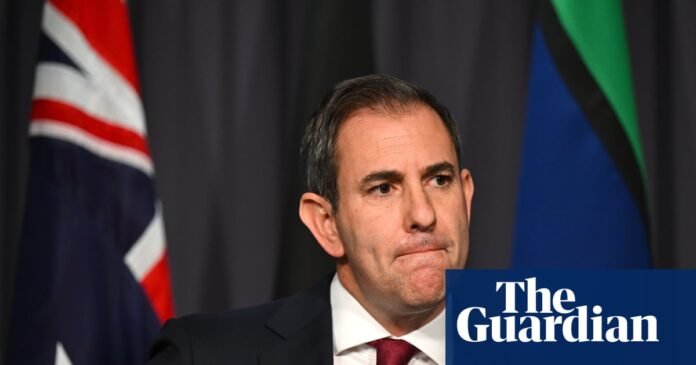When Jim Chalmers declared we needed a national debate on reforming the economy to drive the next generation of prosperity, he scolded the media for its penchant for playing the rule-in-rule-out game.
The irony is that from his high horse, the treasurer had almost certainly ruled out one major change: lifting or broadening the GST.
If Chalmers is being disingenuous when he suggests nothing is off the table at next month’s talkfest – and he absolutely is – then he should have ruled out changes to the consumption tax from the very start.
Many economists argue that lifting or broadening the GST is an essential ingredient in any reform package that fundamentally improves the efficiency of the tax system.
More GST revenue can pay for cuts to income and company tax rates, for example. This shift provides a structurally more stable tax revenue base, and sharpens incentives to work and invest.
Labor as a party, however, is fundamentally opposed to changing the tax on consumption on the basis that it hurts poorer Australians.
Sign up: AU Breaking News email
And the worry about fairness is real.
New analysis by the ANU’s Ben Phillips shows that the GST is “highly regressive”.
Phillips’ modelling shows the bottom fifth of income earners pay 5.4% of their income on consumption taxes. That’s more than twice as much as the top 20% of households, where GST accounts for 2.6% of disposable income.
Broadening the GST to include the things currently excluded – such as fresh food and education – makes the tax even more regressive.
Phillips finds consumption taxes as a share of household budgets climbs to 7.9% for the lowest incomes, and 3.5% for those at the top.
“I think equity concerns are spot on,” Phillips says.
“There would have to be a complicated new approach to compensation for lower and middle income workers to make it politically feasible.
“We would be relying on there being some substantial economic gains from increasing the GST, and they are probably relatively modest.”
If the economics of broadening or lifting the GST are challenging, the politics are horrendous.
The first hurdle is the most obvious: the states get the revenue, while the commonwealth cops the heat.
Even if the Albanese government could agree with its state and territory counterparts to share the proceeds, there is also the issue that the GST distribution system has been fundamentally undermined by the obscenely generous deal with Western Australia, the country’s richest state.
As such, a bigger GST pile without getting rid of this distortion would simply exacerbate what Saul Eslake has called “possibly the worst public policy decision of the 21st century”.
Which begs the question: can we get meaningful tax reform without lifting the GST?
Ken Henry, who authored a major tax paper in 2010 and is considered the country’s high priest of reform, argues that “tax reform cannot be done piecemeal; a big package will be required”.
He recently told The Conversation’s Michelle Grattan “it would be better not to constrain the reform process by ruling out the GST”.
“Having said that, I do think it’s possible to achieve major reform of the Australian taxation system without necessarily increasing the rate or extending the base of the GST.”
Such reforms could be paid for via higher taxes on natural resources, and on wealth and savings – both on capital gains and income from that capital (think property investments and superannuation).
Chalmers’ narrative for the reform roundtable apparently leans into Henry’s view around some kind of tax “grand bargain”.
But again, the treasurer’s ambition is much more narrow.
He has famously described his approach to reform as “bite-sized chunks”, and defended his policy initiatives since coming to power as “modest but meaningful”.
In fact, the most obvious next steps for Labor when it comes to tax is reforming the treatment of family trusts, and introducing a road user charge to replace dwindling fuel excise revenue.
Whether we need another roundtable to get there is an open question.
Viva Hammer, who played a key role in designing America’s immense Tax Cuts and Jobs Act of 2017, had some advice for policymakers.
Speaking at a tax roundtable organised by the independent MP Allegra Spender, Hammer said the ambition should be “to think about doing something better, and not something perfect, because perfection is for the angels”.
Breaking it down to the lowest common denominator, the independent economist Chris Richardson’s advice is “let’s just stop doing dumb things”.
Speaking at the same event in Parliament House on Friday, Richardson said his number one “dumb thing” is how we tax gas through the petroleum rent resources tax (PRRT).
Australia over recent years has become a gas superpower. And yet, incredibly, the tax take has not changed at all, Richardson says.
Labor’s tweaks to the PRRT have not changed this reality – as Richardson says, the forecasts for revenue from this tax are a “big fat nothing” in future years.
“Some people say you can’t change because there would be some ‘sovereign risk’,” he said, referring to the claims that altering these rules puts off foreign investors and can choke off funding for the industry.
“Sovereign risk is where one side gets next to nothing across a long period of time, and our own stupidity has got us there, and we should do better.”
Richardson believes we are also not charging banks enough for the implicit “too big to fail” insurance provided by taxpayers.
The two suggestions, he said, could raise $5-6bn a year.






